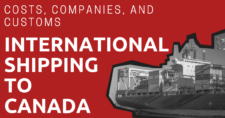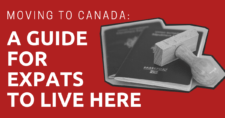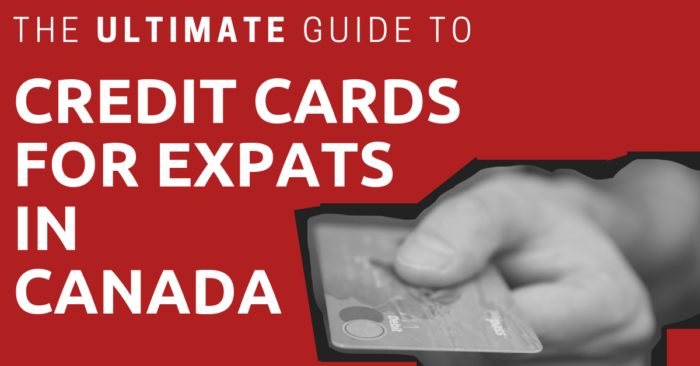
Are you new to Canada and looking for a credit card to help you build up your credit and pay your bills?
You’ll find a lot of cards out there to choose from. But how do you know which one has the best interest rates and lowest annual fees?
In this guide you’ll find out which credit cards are best for expats in Canada.
For a quick summary, read the section below our table of contents. To find out how we came up with the summary, read the entire post.
This article will take approximately 32 minutes to read. Don't have the time right now? No worries. You can email the ad-free version of the article to yourself and read it later!
Disclaimer: This article may include links to products or services offered by ExpatDen’s partners, which give us commissions when you click on them. Although this may influence how they appear in the text, we only recommend solutions that we would use in your situation. Read more in our Advertising Disclosure.
Contents
Summary of this Post
If you’re new to Canada and need to build up your credit, get a secured credit card from TD Bank or CIBC for your first eight months in Canada.
After you’ve paid your bills on time for eight months with your secured card, move on to an unsecured card with no annual fees or foreign transaction fees from RBC.
Using a secure card with annual fees or no foreign transaction fees will be a big benefit if you buy things from websites outside of Canada.
Lastly, if you like to travel, get a no annual fee American Express AIR MILES Credit Card. You’ll earn points every time you travel or shop.
Benefits
Having a local credit card in Canada has its advantages. Some of them include:
- No foreign exchange surcharges
- No fluctuating foreign exchange rates
- Automatic bill payments
- Convenience
- Canadian credit history and scoring
- Form of ID
- Getting a phone plan
- Discounts and rewards
Also, most major credit card companies offer automatic credit card balance payments debited from your bank account monthly.
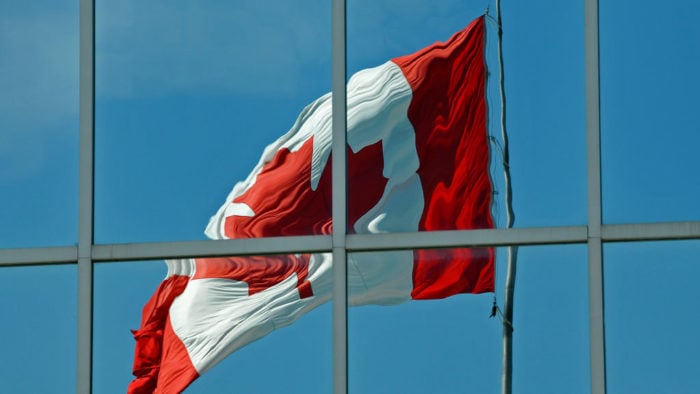
This saves you both time and money, as you never miss a payment.
In short, having one or two credit cards in Canada can make your life a lot easier.
No Foreign Exchange Surcharges
By securing a local Canadian credit card, you no longer have to pay foreign exchanges surcharges when you buy goods and services in Canadian funds.
No Fluctuating Foreign Exchange Rates
You’ll know how much money you’ve spent when your credit card is in local currency.
If you tend to worry about changes in foreign exchange rates for large purchases, having a Canadian card relieves your stress.
Automatic Bill Payments
You can charge a variety of memberships and services to your credit card each month.
This includes home utilities such as electricity and water, and your phone and internet services.
You can also charge gym and club memberships and online subscriptions like Netflix and Spotify.
You can also sign up to debit your credit card payments from your bank account every month.
Convenience
From online shopping to requesting a taxi or Uber to ordering food to your home, having a local credit card offers flexibility and convenience.
You can also use a credit card to send money to Canada.
Canadian Credit History and Credit Score
Interested in leasing or buying a car, renting or owning a home, or starting a business in Canada?
Building Canadian credit history and maintaining a high credit score are important.
A local credit card is the easiest way to do this.
Form of Identity
Canadian credit cards are accepted forms of ID in Canada.
This is less true of foreign credit cards, sometimes because the person reviewing your card may not recognize your card.
You can use your Canadian credit card as ID to open a bank account and to get your government issued health card and insurance.
Getting a Phone Plan
You often need a Canadian credit card to set up a monthly mobile phone contract in Canada.
Some mobile companies use local credit cards to authenticate new phone plans and protect individuals from fraud.
They also use them to do a credit check if needed.
But you don’t need a Canadian card to join Rogers Wireless if you have two forms of Canadian ID, like a government issued immigration form and drivers license.
If you don’t have a credit card or two forms of Canadian ID you can get a co-signer for your phone plan or consider a prepaid calling plan.
Do your research as each mobile phone company has its own requirements and offers.
Discounts
Depending on which credit card you choose, some companies offer discounts on product purchases, services, and insurance.
Rewards
Extended shopping, travel, and health coverage are benefits to having a credit card.
Also, credit card companies offer a rewards program where you get points when you spend money.
You can later redeem those points for products and services.
Canadian Credit History and Scoring
A credit score is a three-digit number you get from credit bureaus based on your credit history.

Your credit history is a record of your ability and proven responsibility in paying off your debts.
A credit bureau is a company that collects and files this info from banks.
The two main credit bureaus in Canada are Equifax Canada and TransUnion Canada.
Credit scores range from 300 to 900.
Although each lender decides credit scores differently, a credit score of about 660 says you’re a low-risk borrower.
Generally, the following holds true about credit scores:
- 300 – 574 is poor
- 575 – 659 is below average
- 660 – 689 is average
- 690 – 740 is good
- 741 – 900 is excellent
You can check your credit score through both Equifax Canada and TransUnion Canada.
Both credit bureaus offer this info online for a surcharge.
Why it’s Important
The higher your credit score, the better.
Good credit gets you lower interest rates and makes it easier for you to get approved for apartments, cell phone plans, and loans.
Having a bad credit score limits your access to the above. And having a low credit score could get you denied to the above.
Having a good credit score makes your move to Canada easier.
It’s worth the discipline and discomfort to commit to this. Try to build it as soon as you arrive.
How it Works
Everyone in Canada who pays bills has a credit score.
At the end of each month, when you pay your monthly bills, your payment info goes to both credit bureaus.
Each credit bureau determines your credit score based on paying your bills on time, and to what degree you paid them in full.
Credit bureaus use this info to create your credit report. Banks, lenders, and even landlords review your report to check your financial security.
As a newcomer, after one year, if you’ve paid off your monthly balances on time, you’ll have created a positive credit score and Canadian credit history.
How to Increase Your Credit Score
It’s important to pay your bills on time every month. You should pay them in full as well.
If you can’t pay them in full, pay what you can towards your telephone and internet bills.
But always pay your credit card, insurance, utilities, and mortgage or rent in full and on time.
Late, partially paid, or skipped bills payments damage your credit score. You want to avoid this, so aim to start paying your bills off in full each month.
If you have a hard time remembering to pay your bills on time, pay them as soon as you get them or set yourself a reminder in your calendar.
One of the easiest and most effective things you can do is have them automatically billed to your credit card.
Then you can have your card balance automatically debited from your bank account each month.
Should your total monthly bills exceed your credit limit, consider applying for two cards, from two different banks.
Note, it’s important to use your credit card every month and pay your balance in full.
This helps you build a good credit score and helps you build rapport with the bank.
This is important if you’re interested in increasing your credit card limit and applying for financing in the future.
Types of Credit Cards
You can get three types of credit cards as a newcomer to Canada:
- secured credit cards
- unsecured credit cards
- prepaid credit cards
You can choose from a variety of credit card companies, but I suggest you choose a major provider such as American Express, Visa, or Mastercard.
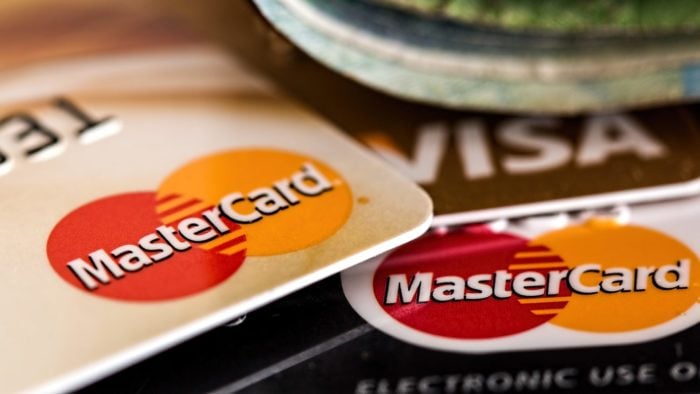
Smaller companies can limit your buying power since you can’t use their cards everywhere.
Secured Credit Cards
Banks need you to have Canadian credit history to get a Canadian credit card from their bank.
As most newcomers don’t have credit history, the fastest way to build history and a positive credit score is to apply for a secured credit card.
A secured credit card is a credit card with a security deposit.
This means, whatever amount you open your card with stays in your bank account and you must leave it there.
Most banks let you invest your security deposit into financial products, such as term deposits, to maximize the interest earned on your deposit.
Each bank has a minimum amount needed to get a secured credit card. Often this is in the range of $500.
For example, Toronto Dominion Bank (TD)’s TD Rewards Visa Card requires a $500 minimum deposit.
And Canadian Imperial Bank of Commerce (CIBC)’s CIBC Dividend Visa Card and CIBC Select Visa Card have the same deposit.
Whatever amount you decide to open your account with, this is your monthly credit limit.
Avoid opening an account with a greater amount than the bank minimum, unless you’re certain you can pay off your balance in full each month.
Canadian banks are strict when assessing your credit score, so you want to make sure you pay off your credit card in full at the end of each month.
The bank teller you speak to may try to persuade you to start with a higher security deposit and monthly credit limit, but it’s in the bank’s best interest, not yours.
You need to open a bank account associated with your secured credit card.
You don’t have to pay your monthly balance from this account. You can pay it from other bank accounts as well.
Some recommendations:
- Avoid trying to increase your credit limit. Wait until the banks offers it to you. This helps you build rapport with the bank.
- Get off a secured credit card after eight months by paying your balance in full each month. Ask your bank. If they say no, try again the next month.
- Apply in person. It lets you talk with a person in front of you and helps you build rapport.
After one year, provided you have paid your bills on time, you can apply for a regular, unsecured credit card and get your deposit back.
With a great credit score you could get one earlier, although no earlier than eight months. Then your choices are vast.
Unsecured Credit Cards
You don’t have to leave a deposit to get an unsecured credit card.
Canadians and newcomers alike need Canadian credit history to apply for an unsecured credit card.
But banks like Canadian Imperial Bank of Commerce (CIBC), Royal Bank of Canada (RBC), and Scotiabank offer unsecured cards to newcomers.
You may need to join their newcomer banking program though.
If you don’t want to join their banking program, you can get a secured credit card, build your credit history, then apply for an unsecured card after eight months.
An unsecured card offers more flexibility and impresses landlords and lenders. I suggest trying to get one as soon as you can.
Newcomer Banking Programs
The newcomer banking programs that most major banks offer include a variety of specialized services such as:
- bank accounts
- credit cards
- Investments
- car loans
- mortgages
They also may not check your Canadian credit history or score.
For example, Royal Bank of Canada offers an RBC Newcomer Advantage program.
This program includes a no monthly fee banking for a year, a variety of unsecured credit cards to choose from, and a no fee safety deposit box.
Canadian Imperial Bank of Commerce offers a CIBC Welcome to Canada Banking Package.
This includes a no monthly fee everyday banking for a year, a variety of unsecured credit cards to choose from, and a lot of other choices.
Scotiabank offers the Scotiabank StartRight Program.
This program includes:
- a no monthly fee checking account for two years
- a variety of unsecured credit cards to choose from
- a rewards program for those with good credit
Each bank is different and has its own restrictions, requirements, and products offered.
You may have to open a checking account with them to join their newcomer banking program.
To give you an example of how a newcomer banking program works, enrolling in the Scotiabank StartRight Program requires you to open a checking account.
You can then get one of a variety of unsecured credit cards.
The unsecured credit card you get depends on your government issued visa type and your annual income.
If you have a student visa you could get a card with a credit limit of up to $1,000.
If you have a Canadian work permit, you can get the following credit limits:
| Annual Income | Credit Limit |
| < $20,000 | $1,000 |
| $20,000 – $50,000 | $2,000 |
| $50,000 – $75,000 | $3,500 |
| $75,000 > | $5,000 |
If you’re a permanent resident who’s been in Canada for under two years, you can get these limits:
| Annual Income | Credit Limit |
| < $50,000 | $2,000 |
| $50,000 – $75,000 | $3,500 |
| $75,000 > | $5,000 |
Among the credit cards offered in the Scotiabank StartRight Program is the Scotiabank American Express card, with a credit limit of $1,000.
This no fee credit card has an annual interest rate of 19.99% on purchases and 22.99% on cash advances, balance transfers, and credit card cheques.
You also earn reward points on every dollar you spend on purchases and may redeem them for travel, merchandise, or gift cards.
The Scotiabank Gold American Express card offers the same interest rates and rewards with a credit limit of $5,000. It also has an annual fee of $99.
Prepaid Credit Cards
Prepaid credit cards are another choice. You can get one without Canadian credit history, a bank account, and minimum deposit.
And if you buy a prepaid card in person, you can pay in cash.
There’s also no risk involved as you can’t overspend, miss a payment, or accrue interest.
Prepaid credit cards don’t impact your Canadian credit history and score. So if you tend to overspend and miss payments, they’re a safe choice.
But if you’re interested in building a Canadian credit history and score, prepaid credit cards won’t help you.
If you want a prepaid card, you pay a set up fee and load as much money as you’d like onto a prepaid card of your choice.
You can keep track of your balance online, and when your balance is low, load more money onto the card—often for a fee.
Your funds also never expire. It’s that simple.
You can get prepaid credit cards online from Canadian Imperial Bank of Commerce (CIBC) and Mastercard.
You can also get them in person at bank branches, check-cashing offices like Money Mart, and some retailers like Canada Post.
You have a variety of cards to choose from and places to get them from.
Do your research as banks and credit cards have different associated fees.
Lenient Card Issuers
Lenient card issuers are retailers such as Canadian Tire, Hudson’s Bay Company, or a grocery chain like No Frills that offer credit cards.
You can apply for a card in their stores or online and their restrictions are laxer than a bank’s.
This might sound attractive, but retailers tend to charge higher interest rates than a bank.
If you’re the type of person who tends to overspend and pay your balance late, stay away from this type of credit card.
The compounding interest can add up and affect your credit score.
Also, you lose the benefit of building rapport with a bank that you may later want to invest with or ask for a loan from.
If you want an account with the same bank that you have an unsecured credit card with, I suggest doing your research.
Compare interest rates between banks and on both secured and unsecured credit cards.
Transferring Your Existing Credit Card to Canada
If you’ve had an American Express credit card for three months or more, you can transfer your existing credit card to American Express Canada.
This is a fantastic, hassle-free way to get a Canadian credit card.
All you need to start the process is your American Express account number, a Canadian home address, and a Canadian phone number.
You can apply by phone from Canada at 1–800–711–5266 and abroad at +1–905–474–0870 (collect call).
You can also apply apply online. The process is straightforward.
You pick your preferred credit card and apply online. A rep contacts you within one week to verify your ID and get any more info they need.
You should have your new credit card within two weeks of American Express Canada receiving your documents.
The entire process should take about three to four weeks.
American Express Canada also honors the Membership Reward points you got in your home country, provided your new credit card is part of the program.
All you need to do is call the telephone number on your old Membership Rewards card and transfer your account. It’s that easy.
If you want to keep your existing American Express Card, you have to pay the old annual fees and any new annual fees of your new Canadian credit card.
If you want to get rid of your existing credit card, you can’t transfer your remaining balance to the new Canadian credit card.
Lastly, if you get your card from a bank other than American Express Bank, you can’t transfer your account.
American Express Canada offers a wide variety of unsecured credit cards to choose from. More than any of the other choices listed in this guide.
One credit card to consider is the no annual fee American Express AIR MILES Credit Card.
With an interest rate of 19.99% on purchases and 22.99% on cash advances, it offers a straightforward rewards program that you can use for airline travel.
It also includes $100,000 worth of travel insurance. Apply for an AIR MILES card and double your rewards.
If you’re interested in a premium credit card, the American Express Cobalt Card offers a lot of perks.
Its tiered rewards program is generous, offering one to five points on every dollar you spend.
You can redeem points for travel, entertainment, and retail purchases.
You can also get insurance that includes:
- $250,000 travel accident insurance
- car rental, theft, and damage insurance
- emergency medical insurance
- hotel burglary insurance.
What is impressive is that it offers a low interest rate of 7.99% on purchases made within the first six months.
This can be useful while you’re settling in.
After the first six months, the interest rate stabilizes at 19.99% on purchases and 22.99% on cash advances.
You can get the American Express Cobalt Card for $10 a month.
Applying for a Credit Card
Applying for a credit card in Canada is pretty straightforward and easy and you’re often approved on the spot.
Although you can apply for a credit card online, as a newcomer it’s a better idea to apply in person.
This is true if you want a card from a bank as you can ask questions and build rapport with the branch.
Where to Apply
I recommend getting a credit card from one of these established banks:
- Canadian Imperial Bank of Commerce (CIBC)
- Royal Bank of Canada (RBC)
- Toronto Dominion Bank (TD)
- Bank of Montreal (BOM)
- Scotiabank
Building credit history with a bank credit card, as opposed to another provider, is an excellent way to build rapport with them.
Also, Canadian Imperial Bank of Commerce (CIBC) and Bank of Montreal (BOM) offer newcomers packages, which include access to financial products and credit cards.
But you don’t have to bank with the same bank you’re getting a credit card from.
You can have credit cards from different banks, although I recommend having no more than two.
A second credit card is a good idea, if for any reason, one card isn’t accepted or the bank’s system is down.
Requirements
Each bank may have their own requirements for applying for a credit card, but you generally need:
- your photo ID
- proof of residency
- proof of age of majority in your province or territory
- proof of income (sometimes)
In Canada, age of majority refers to the age you’re considered an adult by law.
In the provinces of Alberta, Manitoba, Ontario, Prince Edward Island, Quebec, and Saskatchewan the age of majority is 18. In all others it’s 19.
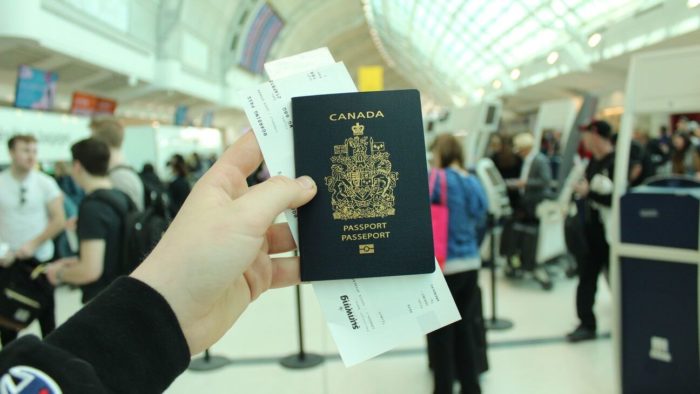
Regardless of how many years have passed since you turned 18 or 19, bring ID that proves your age.
Documents you can use to apply for a credit card include your passport and your government issued immigration form.
But I recommend researching the requirements of the individual bank online before visiting a branch.
If you have a job offer in writing, bring it with you. If you’ve started working in Canada, bring your employee ID card or a letter from your employer stating your salary.
Once you have a credit card, you can use it at another bank as a form of ID to apply for a second credit card.
Fees
As you can choose from a vast number of credit cards and places to get one, fees for each card vary.
Here are some general fees.
Annual Fees
Annual fees for credit cards can vary from zero dollars to anywhere in the neighborhood of $120.
Generally, the higher the annual fees, the more premium the card and the greater the perks.
For example, Royal Bank of Canada offers newcomers the RBC Visa Platinum Avion for an annual fee of $120.
Included with the card is a comprehensive travel insurance package and a points system that allows you to redeem points for travel.
Their RBC Cash Back Mastercard is more conservative, offering fewer perks and requiring no annual fees.
If you’re interested in a credit card with a lot of perks and no annual fees, research the newcomer packages at the major Canadian banks and speak to a bank rep.
You could get a banking package with no annual fees on a credit card if you maintain a minimum balance in a checking account.
This is a good choice once you build a positive Canadian credit history and score.
For example, Toronto Dominion Bank (TD) offers their First Class Travel Visa Infinite Card with a waived annual fee of $120.
To qualify for this card, you need to sign up for a TD All-Inclusive Banking Plan and maintain a minimum monthly balance of $5,000 in a checking account.
Transaction Fees
Canadian credit cards don’t charge transaction fees on purchases made in Canadian dollars.
The fees associated with your credit card are annual fees, accrued interest charges, and foreign transaction fees.
Foreign Transaction Fees
When you buy something in a foreign currency, whether online or abroad, almost every Canadian credit card charges you a foreign transaction fee of 2.5% to 3%.

Scotiabank offers newcomers their Scotiabank Passport Visa Infinite Card which waives foreign transaction fees.
The card has a $139 annual fee, interest rates of 19.99% interest rate on purchases and 22.99% on cash advances, balance transfers, and credit card checks.
To get this card, you must have an annual income of $60,000, a minimum household income of $100,000, or hold minimum assets under management of $250,000.
If you plan to visit America or you make a lot of online purchases in US Dollars, you may want to consider Royal Bank of Canada RBC US Dollar Visa Gold Card.
This card is a part of their RBC Newcomer Advantage program.
As it’s a US Dollar credit card, you don’t pay transaction fees on all purchases made in US Dollars online and abroad.
But you do have to pay a 2.5% transaction fee on everything you buy in Canadian Dollars online and in Canada.
How to Pay Your Credit Card Bill
You can pay your credit card bill in a variety of ways:
- online
- pre-authorized debit
- by telephone
- at an ATM
- in person at a bank branch
- by mail with a check
Banks process credit card payments from Monday to Friday.
If your payment due date falls on a weekend or holiday, you can pay the next business day without penalty.
The time it takes to process your payment depends on your bank and the payment method you choose.
Do your research to avoid missing a payment.
Rewards
The rewards you get with credit cards are vast. Here are a few of the important ones.
Cash Back
You can redeem points for cash deposited into your bank account or towards your credit card balance.
With the RBC Cash Back Mastercard, you can earn up to 2% cash back on grocery store purchases and up to 1% on everyday purchases.
If you drive, the RBC Cash Back Mastercard also offers an associated program with Petro-Canada, a nationwide gas station and carwash chain.
If you apply for a free Petro-Points card and link it to your RBC Cash Back Mastercard, you save $0.03 per liter on fuel, and earn 20% more Petro-Points at Petro-Canada.
You can get the RBC Cash Back Mastercard through Royal Bank of Canada’s RBC Newcomer Advantage program. It has no annual fees.
Travel
You can lower the costs of flights, hotels, and car rentals.

Apply for a points card for your travel provider of choice and double your rewards.
With the American Express Gold Rewards Card you earn two points for every dollar spent on everyday purchases and travel.
You can redeem points for flights booked to anywhere in the world.
The card also offers travel service upgrades like:
- up to a $100 hotel credit on qualifying hotel amenities including dining, spa, golf, and other hotel facilities
- hotel room upgrades at check-in
- car upgrades on car rentals of five or more consecutive days with Hertz Canada
The American Express Gold Rewards Card has an annual fee of $150.
Entertainment
Free entrance to movies, amusement parks, sporting events, you name it.
Scotiabank’s SCENE Visa Card offers one point for every dollar spent on everyday purchases and five points for every dollar spent at Cineplex theaters or Cineplex.com.
The threshold for a free movie is 1,000 points and you receive 2,000 bonus points if you spend $500 on everyday purchases in first three months.
You can get the Scene Visa Card through Scotiabank’s Scotiabank StartRight Program.
Insurance
Save on car rentals and purchases.
Some cards include health insurance when you let them know you’re going on a trip.
For example, TD First Class Travel Visa Infinite Card has an extensive suite of travel insurance.
It includes up to $1 million of travel medical coverage and up to $500,000 travel accident insurance while traveling on a bus, ferry, plane, train, or with a car rental.
The TD First Class Travel Visa Infinite Card is an unsecured credit card offered to newcomers by Toronto Dominion Bank with an annual fee of $120.
You don’t have to join a newcomers package to apply for it.
Gift Cards and Product Purchases
Redeem points for gift cards to use on product purchases, restaurants or services, like a day at the spa.
Some credit card companies offer products from their own website.
The TD Rewards Visa Card, offered by Toronto Dominion Bank comes with the following perks:
- no annual fee
- a tiered points system
- the choice to redeem points for gift cards, merchandise, and a variety of services offered in their online catalog
You also have the choice to redeem points at participating online retailers to get what you want.
You don’t have to join a newcomers package to apply for the TD Rewards Visa Card.
VIP Treatment
Preferred seating in waiting areas in airports and train stations are among some of the perks.
Scotiabank Passport Visa Infinite Card gets you six free passes to over 1,000 airport lounges around the world, regardless of what airline or class.
The card offers a variety of perks including waiving foreign currency transactions fees and a points system that you can use for travel.
You can get Scotiabank’s Passport Visa Infinite Card through their Scotiabank StartRight Program.
Now. On to You
If you’re a new expat in Canada you’ll have to build up your credit to make life easier.
To build up your credit, you’ll need to start with a secured credit card like those from TD Bank or CIBC.
After you’ve paid your bills on time for eight months using a secured credit card, you can move on to an unsecured credit card.
RBC has an unsecured credit card with no annual fees or foreign transaction fees. It’s perfect for expats who buy things from websites outside of Canada.
If you like to travel inside and outside of Canada, get a no annual fee American Express AIR MILES Credit Card. You’ll earn points every time you travel or shop.





